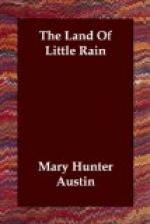THE SCAVENGERS
Fifty-seven buzzards, one on each of fifty-seven fence posts at the rancho El Tejon, on a mirage-breeding September morning, sat solemnly while the white tilted travelers’ vans lumbered down the Canada de los Uvas. After three hours they had only clapped their wings, or exchanged posts. The season’s end in the vast dim valley of the San Joaquin is palpitatingly hot, and the air breathes like cotton wool. Through it all the buzzards sit on the fences and low hummocks, with wings spread fanwise for air. There is no end to them, and they smell to heaven. Their heads droop, and all their communication is a rare, horrid croak.
The increase of wild creatures is in proportion to the things they feed upon: the more carrion the more buzzards. The end of the third successive dry year bred them beyond belief. The first year quail mated sparingly; the second year the wild oats matured no seed; the third, cattle died in their tracks with their heads towards the stopped watercourses. And that year the scavengers were as black as the plague all across the mesa and up the treeless, tumbled hills. On clear days they betook themselves to the upper air, where they hung motionless for hours. That year there were vultures among them, distinguished by the white patches under the wings. All their offensiveness notwithstanding, they have a stately flight. They must also have what pass for good qualities among themselves, for they are social, not to say clannish.
It is a very squalid tragedy,—that of the dying brutes and the scavenger birds. Death by starvation is slow. The heavy-headed, rack-boned cattle totter in the fruitless trails; they stand for long, patient intervals; they lie down and do not rise. There is fear in their eyes when they are first stricken, but afterward only intolerable weariness. I suppose the dumb creatures know, nearly as much of death as do their betters, who have only the more imagination. Their even-breathing submission after the first agony is their tribute to its inevitableness. It needs a nice discrimination to say which of the basket-ribbed cattle is likest to afford the next meal, but the scavengers make few mistakes. One stoops to the quarry and the flock follows.
Cattle once down may be days in dying, They stretch out their necks along the ground, and roll up their slow eyes at longer intervals. The buzzards have all the time, and no beak is dropped or talon struck until the breath is wholly passed. It is doubtless the economy of nature to have the scavengers by to clean up the carrion, but a wolf at the throat would be a shorter agony than the long stalking and sometime perchings of these loathsome watchers. Suppose now it were a man in this long-drawn, hungrily spied upon distress! When Timmie O’Shea was lost on Armogossa Flats for three days without water, Long Tom Basset found him, not by any trail, but by making




